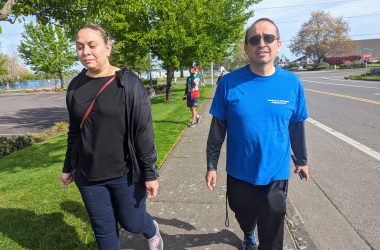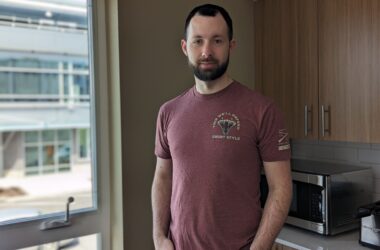
Art Wiktowski, left, and Diane Watson, are running for Chemeketa Community College board. (Photos courtesy of candidates)
For the first time in six years, a Chemeketa Community College board race has drawn a challenger.
Art Witkowski, a former Chemeketa instructor who now works in health sciences education for the state Department of Education, is challenging Diane Watson, a retired community college instructor and administrator, for the zone 6 seat, which represents Keizer, Woodburn and north Marion County.
Ballots for the race will arrive in mailboxes starting May 2 and must be returned by May 21.
Watson was first appointed to the board in 2012 to serve out the remainder of her husband’s term after he passed away. She has been re-elected twice in uncontested races and serves as the board’s vice chair.
Both candidates are first-generation college graduates with years of education experience and see a need for Chemeketa to address declining enrollment, a trend common among Oregon community colleges due to a strong economy.
They’re also excited about incoming Chemeketa president Jessica Howard, who will begin her term as the college’s 11th president in July after president Julie Huckestein’s retirement.
“Our new president really supports diversity initiatives,” Watson said, which has been a priority of hers on the board. Those include efforts to keep Chemeketa affordable by having instructors create low-cost textbooks, as well as student advising and counseling to help with academic success.
Witkowski said he’s considered running for the board before and has an interest in helping the college become more forward-thinking.
He graduated from community college in Michigan, where he found success in a respiratory therapist program after a lackluster academic career in high school.
“It was the first time going to school I did something with my hands,” he said.
He moved to Oregon to become an instructor at Mt. Hood Community College and worked in health care for several decades before going back to teaching at Chemeketa in 2011.
In his state job, Witkowski now works on connecting high school students interested in health sciences to post-high school education, including community colleges.
Witkowski said he’d like to see more individually targeted education to help get students who come into college lacking math or reading skills on track quickly.
He also thinks Chemeketa could grow enrollment with more online and hybrid courses, which would allow working people to fit class into busy schedules.
“We’ve got to turn around the process and not wait for the recession to hit,” he said.
As a board member, he said he’d work with Howard and be more proactive about talking to staff and students about their needs and proposing solutions.
Though he works full time, he said his bosses are supportive of his run and have assured him he’ll have flexibility and time to take care of his duties on the board.
Watson has worked at four community colleges, including serving as dean of students at Linn-Benton in Albany before retiring. There, she oversaw admissions, advising, financial aid, student services and other departments that gave her a well-rounded view of community colleges, she said.
She’d like to see Chemeketa pursue financial aid options for students seeking certificates or single classes. Those courses offer a way to boost enrollment by catering to students already in the workforce who want to get a promotion or learn a new skill. Currently, students can only get federal grants for longer courses of study.
“A lot of times people can’t go for a full year. They can’t make that commitment,” she said.
Also important is reviewing and updating college programs to ensure they’re meeting community and workforce needs, she said. As a board member, she’s heard from employment agencies who say they need more options for certificates or single classes rather than full degrees.
She pointed to her experience, both prior to retirement and on the board, as the main factor setting her apart from her opponent.
“I’ve been there as a teacher, I‘ve been there as a counselor, so I’ve heard the stories of students,” she said.
Neither candidate has invested money in yard signs or mailers. Witkowski said he’s mailed individual letters to people likely to vote in the election based on past election data. Watson has focused on attending community events and introducing herself, she said.
Correction: This article was updated to correct the spelling of Witkowski’s last name.
Reporter Rachel Alexander: [email protected] or 503-575-1241.
Follow Salem Reporter on FACEBOOK and on TWITTER.
YOUR SUBSCRIPTION WOULD HELP — Salem Reporter relies almost exclusively on reader subscriptions to fund its operations. For $10 a month, you hire our entire news team to work for you all month digging out the news of Salem and state government. You get breaking news alerts, emailed newsletters and around-the-clock access to our stories. We depend on subscribers to pay for in-depth, accurate news. Help us grow and get better with your subscription. Sign up HERE.

Rachel Alexander is Salem Reporter’s managing editor. She joined Salem Reporter when it was founded in 2018 and covers city news, education, nonprofits and a little bit of everything else. She’s been a journalist in Oregon and Washington for a decade. Outside of work, she’s a skater and board member with Salem’s Cherry City Roller Derby and can often be found with her nose buried in a book.









